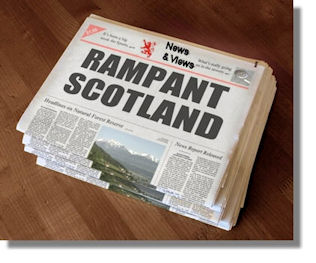News and Views from Scotland

Premium Scotch on the Rocks?
Glenfiddich Distillery, Dufftown Banffshire.
Adventurous investors have been toasting decent returns from whisky and wine investing, but could Brexit be about to hit profits ? Collectible whiskies have recorded annual returns of 36 per cent over the year to the end of September, according to the Icon 100 index of the most sought-after brands compiled by RareWhisky 101, the broker.
The Knight Frank Luxury Investment Index for the second quarter of 2016 shows that fine wine has returned 8 per cent over the previous 12 months.
Under UK tax codes, whisky and wine benefit from being "wasting assets", so they are free from capital gains tax as long as they are not actively traded. Yet the falling pound and prospect of trade tariffs that may result from Brexit could leave investors with a sour taste.
The low pound is good for the whisky industry because more than 90 per cent is sold outside the UK. However, the Scotch Whisky Association warns that many free-trade deals are arranged through the EU so the introduction of tariffs could hit prices. The EU also sets rules on the definition of whisky, its labelling and bottle sizes, which could change after Brexit. A spokesman says: "There remains uncertainty around future access to the EU single market - representing about a third of annual scotch exports - and the UK's future trading relationship with important, non-EU markets."
The most valuable bottles tend to be the most rare. For example, the Glenlivet distillery is releasing a rare collection of one hundred 50-year-old single-malt whiskies as part of its Winchester Collection: Vintage 1966. Bottles are expected to retail at £20,000 each. This month a rare bottle of Glenfiddich from 1937 sold at auction for £68,500, believed to be the highest price paid for a single malt.
Andy Simpson, of Rare Whisky 101, says there are three things to consider when valuing a whisky: age, vintage and silence. "Anything from a silent, or closed, distillery is in heavy demand. The longer ago it was distilled, the better," he says. "Overlay the principle of buying from an iconic distillery and buying small or limited releases, and demand swells. Buy the best quality."
Please give me whatever feedback comes to mind via david@rampantscotland.com.
David
February 2017Return to News and Views Index
Where else would you like to go in Scotland?



